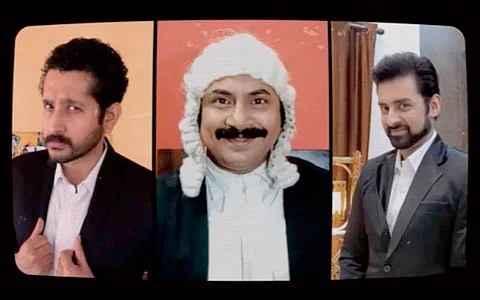
- Reviews
- Power List 2024
- Cannes 2024
- In-Depth Stories
- Web Stories
- News
- FC Lists
- Interviews
- Features
- FC SpecialsFC Specials

The web series' and shorts shot during the lockdown have all worked their stories around the limitations of shooting remotely from home. In A Viral Wedding, the characters communicate through phone and video calls. In Tamil director Gautham Vasudev Menon's Karthik Dial Seytha, in the isolation of the lockdown, Karthik ends up making that call to the ex: Jessie from Menon's 2010 film Vinnaithandi Varuvaaya. A Public Service Ad starring the whose who of Bollywood and other film industries in India make it seem as if they are residents of some kind of all-star make-belief mansion in la la land.
The Bengali web series, Case Jaundice, is not set in anyone's home but in a courtroom. Two lawyers, Mr Sen (Parambrata Chatterjee) and Mr Das (Ankush Hazra), fight it out, like voices in the head. Anirban Chakrabarti, whose appearance and demeanour makes you think of the great Santosh Dutta, is the head in the middle, the judge. Chakrabarti wears a wig, as in the judges of the Crown. In the background of the other two actors you can see a glimpse of their respective homes, a picture gallery on a wall behind Chatterjee, while Hazra's backdrop shows curtains and a table lamp. No two actors appear in the same frame of course, as it has been the case with any of the films made during the lockdown. And since the the director Subhankar Chattopadhyay doesn't pretend to hide it either, you buy into the somewhat surreal set up, and its farcical tone: Each episode, 10 minutes long, is about something related or relevant to the pandemic; in the first the episode for instance, Chatterjee speaks on behalf of humans, and Hazra, who represents the virus, makes it all about the self-centred nature of mankind, and the superiority it feels over other species.
As if the argumentative Bengali has been given the lawyerly garb, a debate over whether states and cities should close themselves from the outside world in the episode titled "Public Society vs Private Society", at one point, arrives at the Total Football of Netherlands, and how the rest of the world would have been poorer without it. The judge gives his two bits sometimes, ending up taking one side.
This sort of thing, where the actors talk rapidly among themselves, would have been easier to do if they were in the same room, where you riff off each other. I don't know how they shot Case Jaundice — did they do it over video calls? — but the actors seem to be on the same page. They seem relaxed, having fun, only too happy to get an opportunity to do what they like doing best at a time when no films, except films such as these, are being made (Chatterjee finds a spot in his house where the light is just correct). And what helps is that they don't take themselves too seriously, with nods to the obvious artifice built into the format of the show. There is a funny meta moment in the Office vs Family episode, when one of the lawyers realise that he has been called by his family, so he has to go, and the episode has to end. They have been working from home after all.